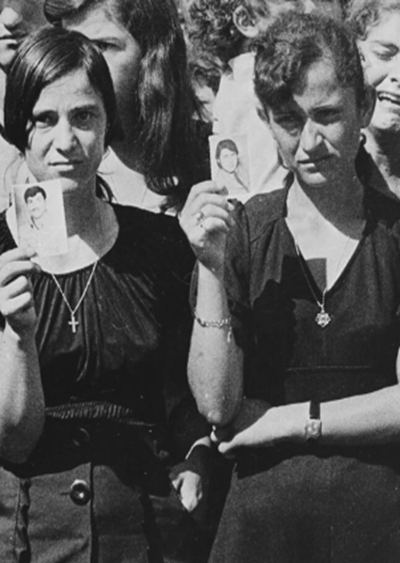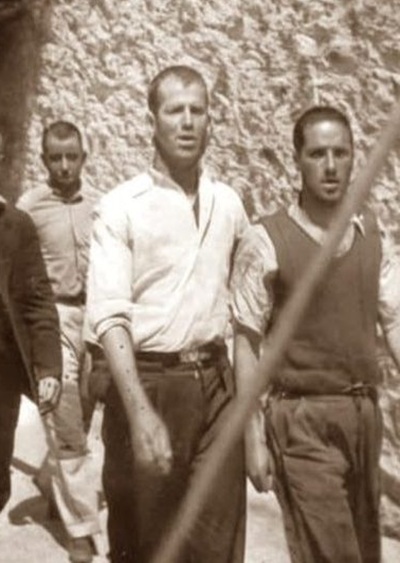
For Greece, Theodorakis was much more than an important composer. He did not hesitate to take a stand and participate in the public debate, his words always carrying a particular weight thanks to the significant position he held in the conscience of the Greeks.
Mikis Theodorakis was an internationally acclaimed and globally recognized composer. His work is a legacy not only for Greek music but for the whole world’s cultural heritage.
For Greece, however, Theodorakis was much more than an important composer. He did not hesitate to take a stand and participate in the public debate, his words always carrying a particular weight, thanks to the significant position he held in the conscience of the Greeks.
His life was, if nothing else, adventurous and creative. He was born in Chios in 1925 but due to his father’s work he moved frequently during his childhood and youth.
During the Second World War, he was in Tripoli, where he joined the resistance against the German and Italian occupation. On March 25, he was arrested by the Italians but managed to escape. During his stay in Athens, he joined the Greek People’s Liberation Army (ELAS) and in 1944 participated in the battles of the ‘December events’ (‘Dekemvriana’). Due to his political activities and his association with the Left, in the post-war years he was exiled to Ikaria and then to Makronisos where he was subjected to horrific torture that caused him paralysis. In these inhumane living conditions, he found a way out through music, by working on the composition of his First Symphony which reflected this experience; the anxiety, the fear, the optimism…
“Hit, hit the chest that lights up
hit, hit the mind that shines
in the blows the slaves grow stronger
you push us down but we go up… ”(Hit, hit)
In 1954 he went to Paris to continue his studies in music with a state scholarship. The years of his stay in the French capital were a period of music creation and great recognition. In 1960 he returned to Greece and recorded the song cycle Epitaphios, with poetry by Giannis Ritsos, in a milestone album for Greek music. Some of his most notable works belong to that decade, such as Axion Esti, based on Odysseas Elytis’ poetry, the music for the play Beautiful City, the music for Epiphania, with poetry by George Seferis, the music for the film Alexis Zorbas directed by Michalis Kakogiannis, and the Ballad of Mauthausen, based on a a poem by Iakovos Kampanellis describing the love of two prisoners in the concentration camp of the same name during World War II.
“My love, how beautiful she is
In her everyday dress
With a little comb on her hair
Nobody knew she was so beautiful”(Song of Songs)
However, his artistic activity did not prevent him from actively participating in the political developments of the turbulent 60’s. Thus, he became President of the newly established “Grigoris Lambrakis” Youth Movement and in 1964 he was elected member of parliament with the United Democratic Left (EDA).
During the years of the dictatorship, Theodorakis faced persecution and imprisonment once again. Together with other members of the Lambrakis Youth, he founded the Patriotic Front (PAM). In August 1967 he was arrested and imprisoned, and ended up in the Averoff Prison Hospital after a prolonged hunger strike. After his release due to international pressure, he remained in exile, while in 1970 he fled abroad, where he continued his struggle against the Dictatorship, organizing concerts with the aim of raising awareness and informing the public. During his stay in Paris, he composed the music for the 18 Songs of the Bitter Homeland, that had been written at the same period by Giannis Ritsos.
“Upon these marbles here
no ugly stain can take hold
or can a chain hold the Greek’s
foot, nor the wind’s”(Here the light)
With the fall of the junta, he returned to Greece as a symbol of the struggle against the dictatorship. The concerts he gave in 1974 for the fall of the junta are historic.
In the following years, he continued his artistic and political activity. He was elected member of parliament with the KKE (Communist Party of Greece) and served as Minister without portfolio from 1990 to 1992, and in later years he continued to intervene in the public affairs of the country.
The life story of Mikis Theodorakis is connected with every critical historical turning point in Greek history from the Occupation onwards. A “revolutionary artist”, as Fidel Castro had described him.
* The verse of the title “great is the sorrow” belongs to Dimitris Christodoulou

















Leave A Comment